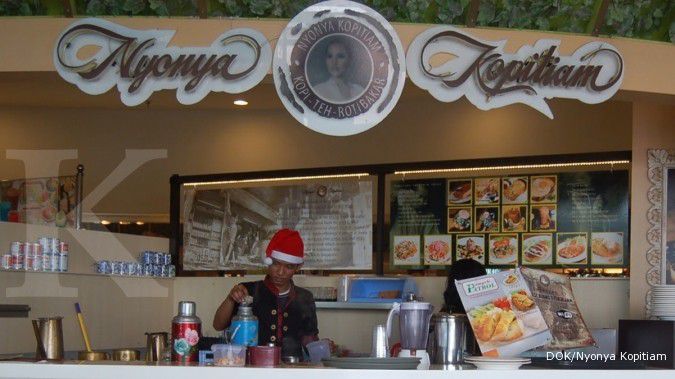JAKARTA. Until a decade ago, finding a decent cup of Java coffee on Java required coffee aficionados to put in some serious legwork, and the results were often unrewarding. But then, the coffee craze kicked in.
As part of a growing trend that started in the early 2000s, coffee shops continue to flourish on the corners of major streets in Java’s major cities and across the archipelago.
After an initial burst of coffee shops opening to meet rising demand, followed by promoting coffee beans grown in Indonesian soil, domestic coffee shops are now diversifying.
Many coffee companies have begun to cater to the increasing demand for ground coffee and roasted coffee beans.
“Our roasted bean sales have increased by more than 10 times since we opened in 2007. Our bean sales now make up more than a third of our total sales,” said Irvan Helmi, one of the duo behind the Anomali Coffee franchise.
Muhammad “Agam” Abgari, Irvan’s partner, said the focus on becoming a coffee roasting company grew gradually clearer throughout the year.
“It started as part of our attempt to get premium quality coffee beans for our own coffee shops. We went to remote regions in the country; we bought roasting machines and we slowly became a roaster,” Agam said.
Irvan recounted that the demand for roasted beans did not appear overnight and the company had to wait patiently for customers to start appreciating the gold black liquid.
“When we first opened, people tended to want ice-blended beverages containing more syrup and milk than coffee. For quite some time, our top-selling products were iced tea and mineral water,” Irvan says.
In an attempt to encourage people to buy coffee, the company switched to serving an expensive premium-brand mineral water to deter customers from buying it.
Irvan said that now the challenge was no longer about introducing local coffee varieties to customers, but about retaining consistency and, at the same time, refining their signature coffee flavors.
Anomali Coffee has expanded to owning four coffee shops in Jakarta, with two others and a training center in Bali, while also supplying coffee to cinema chains and restaurants.
Syenny Widjaja from Bakoel Koffie said the chain also planned to focus on selling roasted beans in the future.
“We have decided to focus on our family’s core business as a coffee roaster,” she said.
Syenny grew up in Warung Tinggi, Indonesia’s oldest coffee company that was founded in 1878 in West Jakarta. It started life as a small shop that used firewood to roast the beans before brewing the coffee and serving it fresh to their customers.
In 1930, the family business made its first export of house-blend coffee powder to Netherlands.
Wanting to continue and preserve the family heritage, in 2000 Syenny and her brother, Hendra, set up Bakoel Koffie — whose name literally means “coffee basket” — selling not only cups of freshly brewed coffee but also freshly roasted coffee beans.
“After all these years, we can see that Indonesians are more knowledgeable about coffee and they want coffee beans as well as just being served cups of coffee,” Syenny said.
Local premium beans
The blooming coffee business, according to coffee consultant Adi W. Taroepratjeka, has paved the way to better access to premium local beans.
“Before 2005, it was very hard for Indonesians to get their hands on quality local coffee beans because they were all exported,” Adi says.
Thereafter, however, coffee exporters gradually started to sell their beans in the local market to meet demand.
“The beans are still expensive because they are sold at export prices, but access to quality local beans has become easier,” Adi says.
“After 2007, more coffee shops and coffee lovers began to roast their own beans.”
The demand for quality local beans increased as more coffee shops and cafés were established, with each of them needing to create their own signature coffee taste.
“It is a win-win situation for everyone involved. Exporters don’t have to put in the same effort as before on exporting the commodity, while coffee shops don’t have to struggle as hard to find premium beans,” Adi said.
Up to now, he said, premium beans tended to refer to Arabica, although a few people have begun to process Robusta beans in a similar way to that used for Arabica, resulting in beans that are full of flavor.
Toni Wahid, who writes extensively about the coffee industry and coffee brewing on his blog cikopi.com, said the coffee shop boom has also helped trigger people’s curiosity on how to enjoy a cup of coffee and their search for the best coffee to suit their personal taste.
“This in turn has led to Indonesian coffee connoisseurs to explore the various methods of coffee brewing and specialty coffee that is available in our own back yard,” Toni said.
Specialty coffee generally means coffee that has gone through a thorough process of cultivation, harvesting, post-harvesting, preservation, roasting and, finally, proper brewing.
Toni said that coffee shops and their related businesses were still increasing in number, and that the trend would continue in the coming years.
“Major companies have begun to acquire local franchises and are putting substantial amounts of money into them,” he said.
Thirty-eight-year-old Bayu Mardiyanto, who has just quit his job at a private company, is among those people interested in entering the coffee shop business.
He plans to open a shop within the next few months in Jakarta, and he is determined to only use Indonesian beans.
While an espresso-based coffee shop demands an investment of at least Rp 300 million (US$30,100), Bayu has around Rp 100 million and plans to use drip-brew and French-press methods at his planned shop.
“I think there’s still a very good chance to succeed in this business,” he said.
(Andreas D. Arditya/The Jakarta Post)
/2013/02/05/67089629.jpg)











